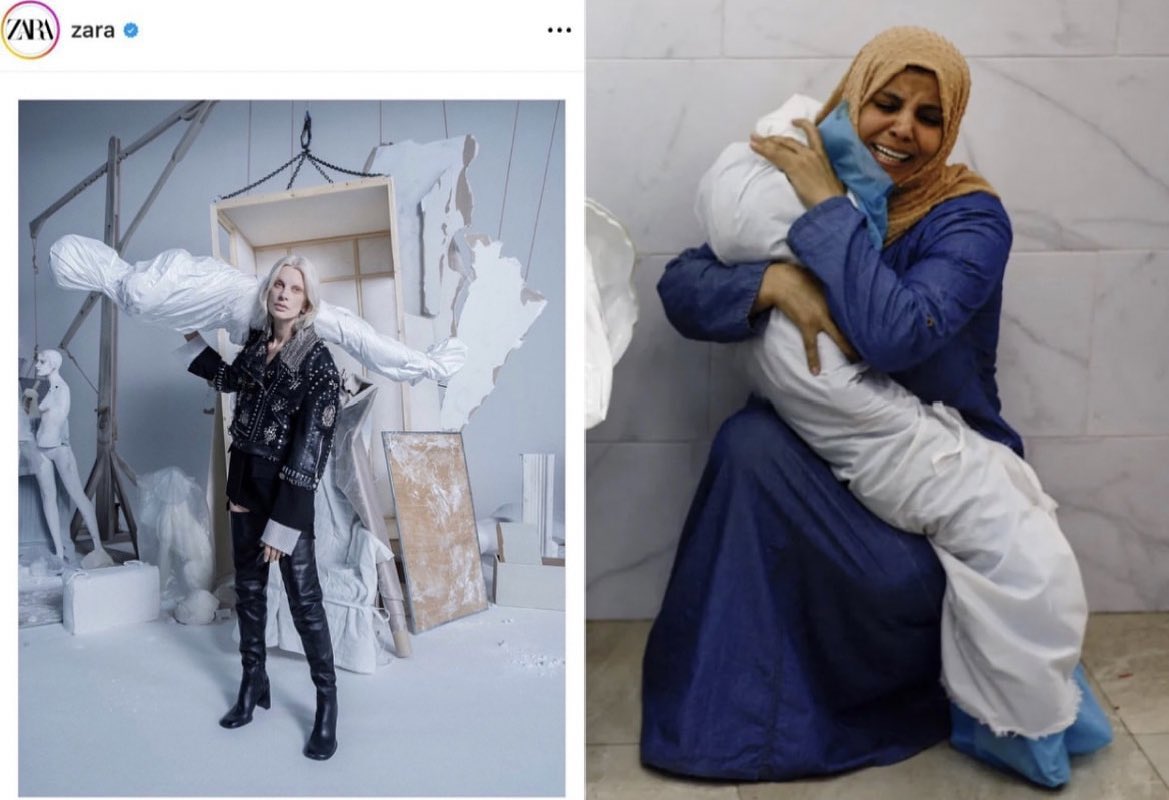The hashtags and social media campaigns are not just a call for boycotting the brand but are also a reflection of a broader discontent with how multinational corporations have chosen the side of the oppressor.
Spanish fashion giant Zara has found itself in the eye of a storm with its latest fashion campaign, “ZARA ATELIER. Collection 04_The Jacket”, which has been widely condemned for its insensitive portrayal of imagery resonant with the genocide currently unfolding in Gaza.
The campaign, supposedly a showcase of the design versatility of a jacket, has instead become a symbol of corporate insensitivity towards the unfolding genocide in Gaza.
The promotional visuals bear an obvious resemblance to the imagery of death and mourning that is all too familiar to anyone who’s been following the harrowing images coming out of the Strip.
What many also found particularly jarring was the representations of bodies wrapped in white, identical to the traditional Muslim burial shroud, in addition to the interior design filled with rubble and a cardboard cutout, eerily reminiscent of the map of Palestine.
The campaign’s obvious trivialisation of Palestinian death and suffering has led to a growing chorus of voices calling for a boycott of Zara. Many believe that the fashion brand, in pursuit of edgy marketing, crossed a line into the territory of blatant disrespect and insensitivity.
That’s why the reaction on social media has been fast and severe.
“Zara knows what it’s doing. Don’t for a second believe that this campaign just came about organically and innocently. Why haven’t they clarified the misunderstanding? Given a statement? Apologized for the symbolism?”, said one user on X.
This sentiment was echoed by others, with one commenting, “Do you think that 20,000 people are killed, and it is normal for you to use their deaths as a marketing method? Don’t come out and say you didn’t mean to… disgusting.”
Others pointed out that the company was no stranger to pro-Israeli stances. “I still remember when Zara’s head women’s designer, Vanessa Perilman, sent racist messages to Palestinian model Qaher Harhash for his Palestinian content in 2021. She received no disciplinary action.”
The hashtags and social media campaigns are not just a call for boycotting the brand but are also a reflection of a broader discontent with how multinational corporations have chosen the side of the oppressor.
The brand has yet to issue a formal statement or response to the controversy. The lack of response has only served to amplify the calls for a boycott, with potential long-term ramifications for the brand’s image and consumer base.
Zara is no stranger to calls for boycotts.
The brand’s past dealings, particularly its association with controversial Israeli figures, have previously sparked significant backlash.
Last year, on 24 October, Palestinians initiated a boycott of Zara following revelations that Joey Schwebel, the chairman of Zara’s Israeli line and a Canadian-Israeli dual national, had hosted a campaign event for the far-right Knesset member Itamar Ben Gvir.
This event, held a week before Israel’s legislative elections scheduled for 1 November, amplified tensions given Ben Gvir’s well-known anti-Palestinian extremist stance.
Itamar Ben Gvir leads the far-right nationalist party Otzma Yehudit, known in English as Jewish Power, a group noted for its extreme views.
The Israeli news channel 12 first brought this controversial meeting to light on 20 October. In response, Palestinians within the occupied territories initiated online campaigns, calling for a boycott of Zara products.
Social media was soon awash with videos of Palestinians burning clothes from Zara, in a symbolic gesture to reject what they termed as a “racist company”.
Adding to the controversy, Ben Gvir was captured on video on the evening of 13 October in the occupied east Jerusalem neighbourhood of Sheikh Jarrah, where he was seen wielding a pistol. In this video, he was urging settlers and police to use lethal force against Palestinians throwing stones at occupation forces.
Ben Gvir’s notoriety is further compounded by his admiration for extremist settler Baruch Goldstein, who was responsible for the massacre of 29 Palestinians at the Ibrahimi Mosque in 1994.







